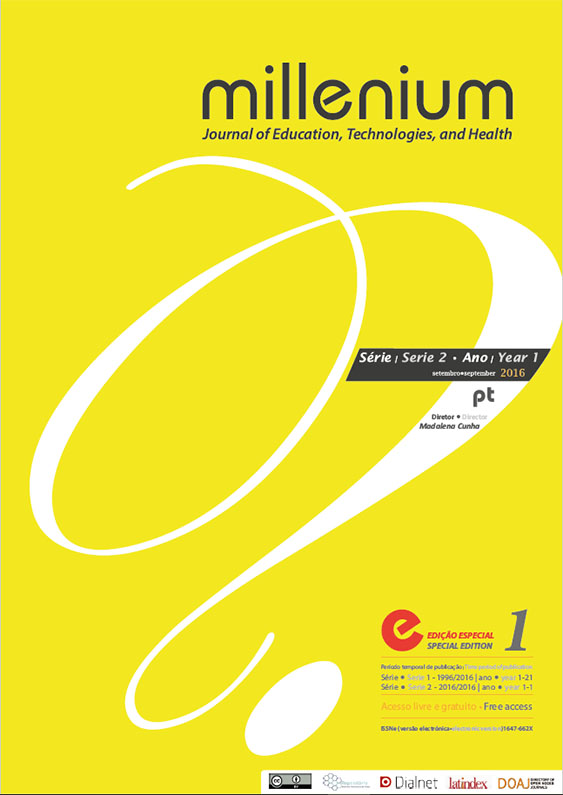Mother ’s Knowledge about breastfeeding : Relationship with sociodemographic variables
Keywords:
Breastfeeding, Knowledge, MothersAbstract
Introduction: Although investment in promoting, protecting and supporting breastfeeding, acknowledged the need for greater investment to which the indicators recommended by WHO can be reached.
Objectives: Evaluate the knowledge of mothers about breastfeeding and its relationship with socio-demographic variables.
Methods: Quantitative, descriptive and cross-sectional study, applied to a non-probability sample of 100 mothers of newborns up to 1 year of life. Data collection was carried out through a socio-demographic questionnaire and a self-report questionnaire.
Results: Were classified with good knowledge about breastfeeding 39% of mothers and 32% with poor knowledge, 93% admitted the importance of initiation breastfeeding within the first hour of baby’s life and defending 28% that it should be exclusive up to 6 months, although only 45% point out its benefits for the baby. The knowledge of the composition of breast milk, immune protection and identification of signs of correct picks up signals was named by 83% of mothers. The knowledge were higher in mothers with higher level education, aged between 26-36 years, married and living in rural areas, but only statistically significant in those with higher education.
Conclusions: If the promotion, protection and support of breastfeeding have recognized a great investment during last years, we
admit, given these results, the need to adapt the (in)training to the socio-cultural context of mothers.
Downloads
References
Aguiar, H., & Silva, A. (2011). Aleitamento materno: A importância de intervir. Acta Médica Portuguesa, 24, 889-896.
Alarcão, V., Ferreira, I., Simões, R., Fernandes, M., & Nicola, P. (2012). Fatores relacionados com o aumento da prevalência e
exclusividade do aleitamento materno em Portugal nos primeiros seis meses de vida. Revista SPCNA, 18(2), 53.
Almeida, N., Fernandes, A., & Araújo, C. (2004). Aleitamento materno: Uma abordagem sobre o papel do enfermeiro no pósparto.
Revista Eletrónica de Enfermagem, 6(3), 358-367.
Andrade, M., Oliveira, M., Bezerra Filho, J., Bezerra, M., Almeida, L., & Castro e Veras, M. (2009). Desmame precoce: Vivência
entre mães atendidas em unidade básica de saúde em Fortaleza-Ceará. Revista da Rede de Enfermagem do Nordeste,
(1), 104-113.
Barge, S., & Carvalho, M. (2011). Prevalência e fatores condicionantes do aleitamento materno: Estudo ALMAT. Revista
Portuguesa de Clínica Geral, 27, 518-525.
Bassichetto, K., & Réa, M. (2008). Aconselhamento em alimentação infantil: Um estudo de intervenção. Jornal de Pediatria,
(1), 75-82.
Coelho, A. M. G. (2015). Prevalência e fatores determinantes para aleitamento materno no Vale Tâmega e Sousa (Dissertação
de mestrado, Universidade do Porto). Acedido em https://sigarra.up.pt/fmup/pt/pub_geral.show_file?pi_gdoc_
id=529242
Galvão, D. M. (2006). Amamentação bem-sucedida: Alguns fatores determinantes. Loures: Lusociência.
Lawrence, R., & Lawrence, R. (2016). Breastfeeding: A guide for the medical profession (8th ed.). Philadelphia: Elsevier.
Levy, L., & Bértolo, H. (2012). Manual de aleitamento materno. Lisboa: Comité Português para a UN ICEF e Comissão Nacional
Iniciativa Hospitais Amigos dos Bebés.
Lourenço, R. (2009). Aleitamento materno: Uma prioridade para o século XX I. Revista Portuguesa de Clínica Geral, 25, 344-346.
Marinho, C., & Leal, I. (2004). Os profissionais de saúde e o aleitamento materno: Um estudo exploratório sobre as atitudes de
médicos e enfermeiros. Revista Psicologia, Saúde e Doenças, 5(1), 93-105.
Pereira, M. A. (2006). Aleitamento materno: Importância da correção da pega no sucesso da amamentação: Resultados de um
estudo experimental. Loures: Lusociência.
Portugal, Ministério da Saúde, Direção Geral de Saúde. (2014). Registo do aleitamento materno, RAM: Relatório de janeiro a
dezembro de 2013. Lisboa: DGS. Acedido em https://www.dgs.pt/documentos-e-publicacoes/iv-relatorio-com-osdados-
do-registo-do-aleitamento-materno-2013.aspx
Ribeiro, M., Morais, A., Santos, E., & Curopos, L. (2015, Abril). Adesão à amamentação na primeira hora de vida do recémnascido.
Poster apresentado nas VIII Jornadas sobre Tecnologia e Saúde, Guarda, Portugal. Acedido em https://
bibliotecadigital.ipb.pt/bitstream/10198/11788/1/Aleitamento_poster_1hora%20vida.pdf
Silva, T. (2013). Aleitamento materno: Prevalência e fatores que influenciam a duração a sua modalidade exclusiva nos primeiros
seis meses de idade. Acta Pediátrica Portuguesa, 44(5), 223-228.
Vilas-Boas, J.M. O. (2013). Educar para cuidar: O papel do enfermeiro de família na promoção, proteção e apoio ao aleitamento
materno (Dissertação de mestrado, Universidade do Minho). Acedido em http://hdl.handle.net/1822/29228
Victora, G., Bahl, R., Barros, A., França, G., Horton, S., Krasevec, J., ... & Rollins, N. (2016). Breastfeeding in the 21st century:
Epidemiology, mechanisms, and lifelong effect. The Lancet, 387(10017), 475–490.
World Health Organization. (2000). Collaborative study team on the role of breastfeeding on the prevention of infant mortality:
Effect of breastfeeding on infant and child mortality due to infectious diseases in less developed countries: A pooled
analysis. Lancet, 5, 355, 451-455.
World Health Organization (2003). Global strategy for infant and young child feeding. Genebra: World Health Organization,
UN ICEF.
Downloads
How to Cite
Issue
Section
License
Authors who submit proposals for this journal agree to the following terms:
a) Articles are published under the Licença Creative Commons (CC BY 4.0), in full open-access, without any cost or fees of any kind to the author or the reader;
b) The authors retain copyright and grant the journal right of first publication, allowing the free sharing of work, provided it is correctly attributed the authorship and initial publication in this journal;
c) The authors are permitted to take on additional contracts separately for non-exclusive distribution of the version of the work published in this journal (eg, post it to an institutional repository or as a book), with an acknowledgment of its initial publication in this journal;
d) Authors are permitted and encouraged to publish and distribute their work online (eg, in institutional repositories or on their website) as it can lead to productive exchanges, as well as increase the impact and citation of published work
Documents required for submission
Article template (Editable format)





